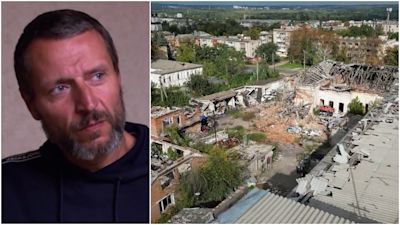Ukrainian retraces steps to torture chamber where he was 'electrocuted and beaten for six days'

Residents of the Ukrainian city, Izium, have told ITV News of their 'traumatic' experiences living under Russian occupation, as ITV News' John Ray reports
It’s little more than a week since the Russians' hasty retreat from Izium in the face of Ukraine’s spectacular advance. The rumble of artillery fire is a reminder the front line has moved on – though not too far.
To a shell-shocked civilian population, the war can still feel more real than the unquiet peace that has descended up this small city.
Yulia pushes her bicycle along a broad street lined by the blackened and smashed ruins of apartment blocks.
‘’Life with the Russian here was a nightmare,’’ she tells me. ‘’My mother is 77. We could not leave. She was so terrified. She became paralysed with the fear.’’
It’s here that investigators have been exhuming bodies from mass graves in woodland. Ukraine claims there is evidence of war crimes. We discover more for ourselves.
During the long months of occupation, Russian forces used the police station to hold prisoners it suspected of ‘’collaborating’’ with Ukrainian forces.
We head down into the dark depths of the building - to a basement of cold, dark, stinking cells.
Four prisoners in each cramped room. No lighting. No heating. A fetid stench. One bucket contains bandages. And blood.
'A really grizzly scene...': ITV News Correspondent John Ray reports from a cell used to hold Ukrainian prisoners
In one of these cells, Maxim Maximov says he was held for six days. Twice he was hauled by his captors to a cavernous underground bunker; blindfolded with his hands and feet bound. They attached cables to his fingers and sent convulsions of electricity though his body, he says.
‘’They beat me with a stick as well. But I didn’t even feel those blows. I could only feel the pain from the electricity. It has left me deaf in my left ear,’’ Maxim says.
He never saw the faces of those who inflicted this pain, but believes he knows what kind of men they were.
‘’They were killers,’’ he says.
I ask Maxim if he thought he would ever see daylight again.
‘’Logic told me that I would never leave this place alive. But there was an inner feeling I would get free,’’ he replies.
Maxim claims Russian forces tortured him until he was deaf in one ear
Liberation came when the Ukrainian army recaptured the ruined city. Russia has denied every allegation of torture, of crime against humanity. But across the street from the jail we meet Lubov Palamarchuk, and she says she knows what she saw when prisoners were unloaded.
‘’The prisoners were hooded,’’ she tells us. ‘’They pushed them into the building. And then, such sounds, I heard. Shouts and screams. The noise was inhuman.’’
Russia’s retreat has left deep scars on this city - on its buildings, on its people and on their souls - that might never truly heal.